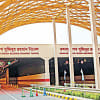The ecocidal mindset of our policymakers

Back when I was a full-time journalist, I heard an intriguing story about a top bureaucrat who was once visiting the country's coastline, which is dotted with Zhaw trees, an essential species that protects the ever-erosive coastline of this deltaic land. The official suddenly began charging the forest staffers, "What is the use of such a tree? Why don't you plant teak along the coastline, the wood of which has a great demand in the market for luxury furniture?" Dumbfounded, one of the staffers came forward to explain the pivotal role the Zhaw tree plays as a natural shield against catastrophes.
In 1871, the British colonists introduced teak, aiming to generate revenue from the forests in the hilly region of Kaptai, using seeds from Myanmar, just 14 years after the Sepoy Mutiny against British rule. Though teak has local and global demand for the furniture industry, it inflicts damage to the soil's properties, soaking up water from the forest floor and turning it dry.
The question posed by the bureaucrat reflects not only the depth of his ignorance but also reveals the general mindset of our policymakers. Such predatory colonial views can be traced as far back as to the travelogue of Francis Buchanan, a Scottish physician hired by the then East India Company to take stock of the prospect of spice cultivation in 1798.
His highly cited book Francis Buchanan in Southeast Bengal (1798): His Journey to Chittagong, the Chittagong Hill Tracts, Noakhali, and Comilla still stands as a glaring example of how the British ripped apart vast swathes of forestland and wildlife to facilitate the commercialisation of this region's greeneries. Buchanan's idea was that anything in the forest that couldn't be turned into cash was extraneous, marking the manifestation of a colonial outlook of our forestlands. Buchanan singled out two bottlenecks that stood in the way of profit-mongering: dense forests and their wildlife. The forest was seen as a mere jungle; a safe home for wild predators, and hence needed to be cleared off for revenue generation. Unfortunately, Buchanan's 226-year-old proposition still takes centre stage in our development planning.
After all, if this wasn't the case, who on earth would have approved the felling of 5.2 million trees to make space for an economic zone in a Mirsarai mangrove forest, rendering 7,000 deer, along with other important species, without a habitat overnight? How else could a development project to build a 102-km railway line for tourists get the nod to traverse through three forests protected by various conservation status and consisting of 6,70,000 trees (of which hundreds are mother trees) and raze a belt of 45 large hills (that too by blocking 16 life-saving corridors for the Asian Elephant)? All of this ecocidal devastation was designed even while there was an alternative to avoid the damage.
When we cut down a mother tree, we kill 300 forms of life that call it home. A mature tree provides 200 kg of oxygen, enough for 10 people a year, and through photosynthesis, a mature tree can absorb 22 kg of carbon dioxide from the atmosphere aside from performing other vital roles in a complex forest ecosystem. It says volumes about the mindset of our bureaucrats when we see how adamant they are about taking over 700 acres of protected forest in Shuknachhari in Cox's Bazar, declared an ecologically critical area (ECA) by the government decades back, for building a civil service academy. They argue that there will be green areas to recoup biodiversity loss. Clearing out forestland almost 3.5 times larger than our entire parliament complex and planting a few hundred trees to offset the loss is the only defence they could come up with.
Even our former environment minister Md Shahab Uddin had taken up a project to build a safari park in Lathitila reserved forest in Sylhet, citing the intention of preventing further encroachment of the forest. Ecnec has already approved the project. However, as a minister, it was his duty to protect the forest from encroachment, identify the encroachers, take exemplary punitive measures against forest offenders, and resort to departmental action against the forest official who had shown leniency towards encroachers, allowing the crisis to exacerbate. However, the minister turned the failure into a Tk 1,000 crore project, facilitating the building of a concrete structure inside a natural forest and allowing thousands of visitors to disrupt the natural environment. All this is against the very basic conservation technique of keeping a forest undisturbed and unharmed since it has an in-built healing capacity.
It is due to such taking over of forestland that the deforestation rate of Bangladesh is now at 2.6 percent, almost double the global average.
Our policymakers remain quite oblivious to the commitment they make on the global stage to prevent deforestation, and this is made clear when they plan megaprojects. When Bangladesh is already bearing the brunt of climate change impacts, such a gap between our words and actions cripples our credibility. This could appear as us undermining our sufferings in front of the global audiences.
We need our policymakers to get out of their colonial mindset and think deeply about nature, forests, wildlife, and their value in the lives of millions in Bangladesh. Already, we rank high, at the seventh position, on the list of climate-vulnerable countries. We need more mangrove forests and tropical forests for clean air, to reduce the impact of heat waves, for the generation of freshwater, and for the pollination required for agriculture. We can't afford to stick to the mindset the British left behind. As one Cree Indian prophecy goes: "Only when the last tree has been cut down, the last fish has been caught, and the last stream poisoned, will we realise we cannot eat money."
Mostafa Yousuf is a journalist and researcher.
Views expressed in this article are the author's own.
Follow The Daily Star Opinion on Facebook for the latest opinions, commentaries and analyses by experts and professionals. To contribute your article or letter to The Daily Star Opinion, see our guidelines for submission.

 For all latest news, follow The Daily Star's Google News channel.
For all latest news, follow The Daily Star's Google News channel. 










Comments